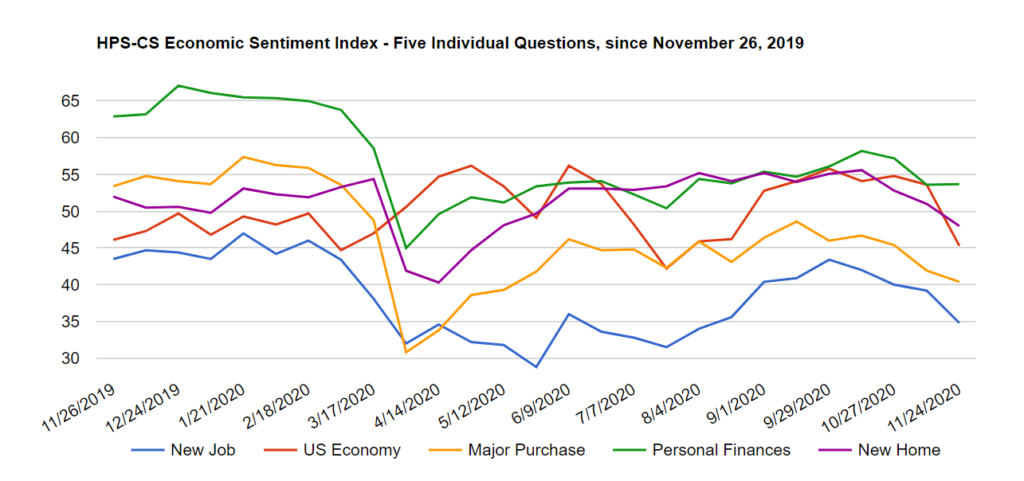The HPS-CivicScience Economic Sentiment Index (“ESI”) is a “living” index that measures U.S. adults’ expectations for the economy going forward, as well as their feelings about current conditions for major purchases. The primary goal of the Index is to accurately measure movements in overall national economic sentiment and to provide a more sophisticated alternative to existing economic sentiment indices. Unlike other prominent indices that release consumer sentiment estimates infrequently, the HPS-CivicScience Index is updated in real-time as responses are collected continuously every hour, every day. Large-scale cross-tabulation of survey responses and consumer attributes enable more granular analyses than are currently possible through prevailing measures.
Excerpt From the Latest Reading:
Consumer economic sentiment plunged for the third straight reading as COVID-19 cases surge to their highest levels during the pandemic and many Americans prepare for a modified holiday season. The latest reading of the HPS-CivicScience Economic Sentiment Index (ESI) showed a drop of 3.4 points to 44.4, the largest decline in sentiment since March. The ESI has now fallen 6.9 points since October, led by a remarkable 8.8-point decline in confidence toward the U.S. economy.
Four of the five individual indicators fell during the two-week reading period. The largest decline was a record-setting drop in confidence toward the U.S. economy, which fell by an unprecedented 8.3 points. This dwarfs the previous record—a 6.0-point decline—set back in July, and comes as many experts fear that the new wave of COVID infections could have a significant impact on economic growth. Confidence in the labor market also experienced a substantial decline, falling 4.4 points to 34.8. Confidence in the labor market has now fallen 7.2 points over the past three readings, returning to a trough not seen since the summer. Confidence in the hot housing market also declined, with the indicator falling 3.0 points, moving the previously outlying positive indicator back in line with overall ESI trends. Confidence in making a major purchase dropped 1.5 points heading into the holiday shopping season. Lastly, confidence in personal finances was the sole indicator to rise, increasing 0.1 points to 53.7.
The decline in confidence over the past two weeks comes as COVID-19 case numbers have risen above 100,000 for over 20 consecutive days and hospitals continue to experience record-high numbers of COVID-19 patients. States across the country are beginning to reimpose restrictions to slow the spread, and there is growing concern the surge will negatively impact the economy. For the first time in over a month, the number of Americans filing for unemployment claims increased last week, and new data reveals a wide gap in unemployment between those in high and low earning industries, with the highest earners recovering significantly more quickly. This economic uncertainty may manifest in lower consumer spending during the holiday season, as polls show consumers are less likely to buy a gift for themselves and more than twice as many say they will be spending less versus more than last year. Despite rising concerns, there continues to be little movement on a federal economic stimulus package, and Treasury Secretary Steven Mnuchin said he will not extend most of the Federal Reserve’s emergency lending programs.









